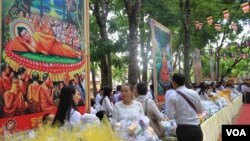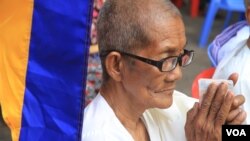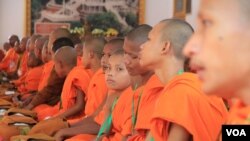Some 40 kilometers from Phnom Penh, hundreds of monks, government officials, students and citizens gathered last week at the foot of Oudong Mountain to celebrate Vesak, or Buddha Day, one of the faith’s most important holidays.
The celebrations at Oudong, where relics said to be from the Buddha himself are interred, were held to commemorate the birthday, enlightenment and death of Gautama Buddha, the primary figure in Buddhism.
Clad in all white, Sao Nun, 77, a nun at a Kandal temple, said she had attended the event every year to “recall his [Buddha’s] virtues as our teacher. We respect and think of his virtue.”
Attendees displayed paintings of the Buddha and offered flowers and alms.
Despite Buddhism’s continued popularity in Cambodia, Nun said she was disappointed that attendance numbers at the festival had noticeably dropped.
“I’m a bit sorry seeing the number of participant is low like this. It depends on their belief. We are thankful to our parents so we cannot skip it. We have to come,” she said.
Meas Rom, 69, another nun who joined the festivities, said attendance had more than halved since a few years ago, but suggested that it may be because other celebrations had been launched elsewhere.
“I’m not so worried. I’m happy that [other] temples also do the same; it’s not different [from here]. Fewer monks and people join here, but it doesn’t mean they missed joining the Vesak,” she said.
The United Nations has recognized Vesak, which is celebrated across the world, as an international day of importance since 1999.
Nhean Phoen, undersecretary of state at the Ministry of Religion and Cultures, said the low turnout was to be expected as the celebrations becomes more decentralized.
“Today, we can say that there are few people, but it’s because they are at other temples, they have been encouraged to celebrate so people can join. There are celebrations at the temples and people can also come here,” he said.
While the overall numbers have decreased, Nun says she has noticed that more young Cambodians are taking part.
“When they join, they can see [and learn] and they can educate other students or their friends. Another thing: when they learned about [Buddha’s teachings], they respect the elderly and their parents,” she said.
Phay Monyroth, a local high school student, agreed. “We can understand about society and [the teachings] of Buddhism, which tells us about merit and demerit,” he said.









